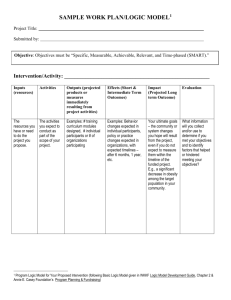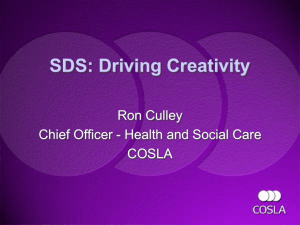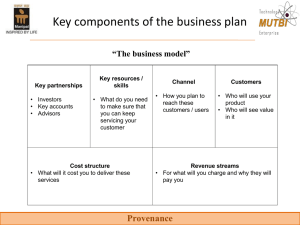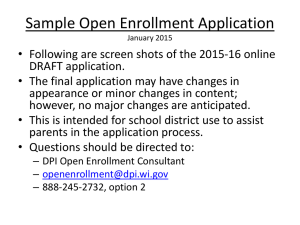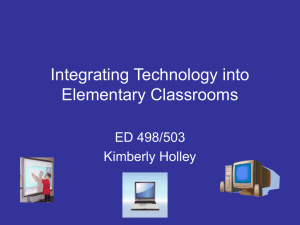NECP SC Presentation 10-1-2012
advertisement
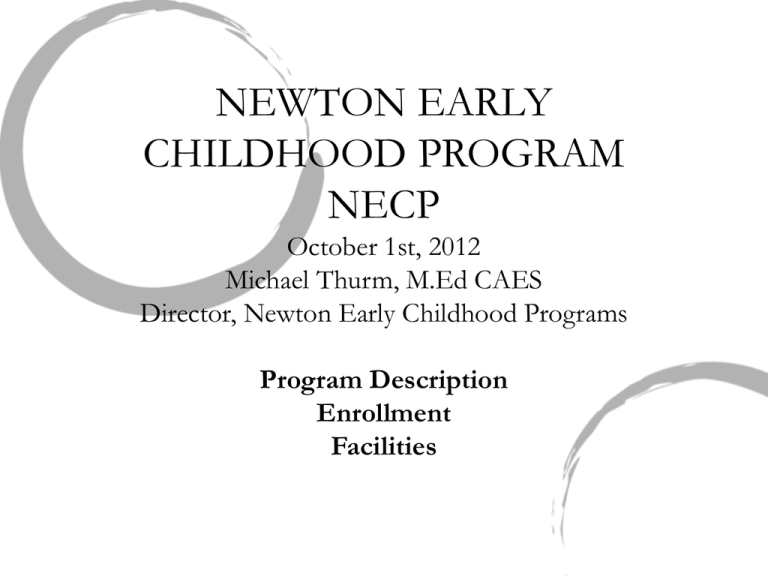
NEWTON EARLY CHILDHOOD PROGRAM NECP October 1st, 2012 Michael Thurm, M.Ed CAES Director, Newton Early Childhood Programs Program Description Enrollment Facilities WHO IS SERVED? • Students with special needs are Newton residents eligible to receive special education services on an Individualized Education Program (IEP) • Typically developing peers are primarily Newton residents, though some reside in neighboring districts, who attend NECP via tuition CLASSROOMS and HOURS 8 Morning Integrated Classrooms-Ed Center/LE 9:00-12:00 Monday-Friday 2 Extended Day Integrated Classrooms-Ed Center 8:30-1:30 four days/week 8:30-12:00 one day/week 1 Self-Contained Classroom-Ed Center 8:30-2:30 three days/week 8:30-2:00 one day/week 8:30-12:00 one day/week CLASSROOM STAFF • Each classroom is taught by a Masters level special education teacher • Each classroom is supported by paraprofessionals, including teaching assistants and behavior therapists • Each classroom is supported by a variety of related service staff (e.g. speech/language pathologists, occupational therapists, physical therapists, etc.) as part of a transdisciplinary team PROGRAM TUITION Students with special needs attend under Free and Appropriate Public Education (FAPE). Enrollment for Typical Peers is Tuition Based 2012-2013 School Year: 9:00am - 12:00pm Program $4,615.58 8:30am - 1:30pm Program $6,684.02 ENROLLMENT • As of October 1, 2012 • Total Enrollment: 216 • Students with special needs enrolled in preschool classrooms: 67 • Typically developing students enrolled in preschool classrooms: 73 • Students with special needs receiving related services only: 76 Classroom Enrollment for Students with Special Needs October 1st June 1st School Year Increase 2009/2010 64 81 +17 2010/2011 63 78 +15 2011/2012 59 81 +22 2012/2013 67 (85) (projected) (+18) (projected) 2013/2014 (63) (projected) (81) (projected) (+18) (projected) Related Services Only Enrollment for Students with Special Needs October 1st June 1st School Year Increase 2009/2010 65 126 +61 2010/2011 55 117 +62 2011/2012 60 117 +57 2012/2013 76 (136) (projected) (+60) (projected) 2013/2014 (64) (projected) (124) (projected) (+60) (projected) Total Enrollment Numbers Total Enrollment = Students with special needs enrolled in classrooms + students with special needs receiving related services only + typically developing peers October 1st June 1st School Year Increase 2009/2010 200 280 +80 2010/2011 192 274 +82 2011/2012 193 273 +80 2012/2013 216 (298) (projected) (+82) (projected) 2013/2014 (projected) (200) (projected) (282) (projected) (+82) (projected) Benefits of a Single Site Facility I. Program Flexibility and Space a. Student transitions: Single site removes the potential for preschool students to have to transition between two different school locations over the course of two preschool years. b. Recreation facility: Playground structures at both the Education Center and Lincoln-Eliot are not accessible for students with physical disabilities. Preschool students at Lincoln-Eliot must access a structure designed for and used simultaneously by K-5 students. c. Suitable classroom placements: Three classrooms and two treatment spaces at Lincoln-Eliot are located on the third floor of the school building, thus requiring multiple trips up and down stairs for young children and limiting placement options for students with physical disabilities. II. Greater Collaboration a. Staff collaboration: Single site allows for enhanced staff collaboration opportunities and more effective participation in district initiatives such as Professional Learning Communities (PLC) and Instructional Rounds b. Parent community: Single site promotes enhanced sense of community as a school program, therefore increasing parent participation and involvement in school decision making and activities. III. Potential Revenue and Cost Savings a. Increase programming options: Single site will allow for additional program initiatives to increase typical peer enrollment and tuition, including but not limited to: - Two day/three day classroom models - AM/PM double session classroom models - Early morning drop-off program - After school care program b. Streamline resources: Single site will reduce the need for employees to travel between sites, and will potentially reduce transportation costs by condensing bus routes for children living in the same neighborhood currently being routed to separate school locations. IV. Improve Arrival/Dismissal Routines a. Safe arrival/dimissal plans for children and families: Single site will allow for safe, organized, and convenient arrival and dismissal routines for students and families. Currently, many families with children at the Education Center site must negotiate crossing Walnut Street to access the school building and/or navigate the Education Center parking lot. Families with children at the Lincoln-Eliot site enter and exit the building from three separate entrances (Pearl St., Jackson St., and Gardner St.) at multiple times throughout the school day.
